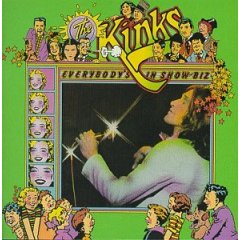| Everybody's in Show-Biz | ||||
|---|---|---|---|---|
 | ||||
| Studio album and live album by | ||||
| Released | 1 September 1972 | |||
| Recorded |
| |||
| Venue | Carnegie Hall, New York City | |||
| Studio | Morgan, London | |||
| Genre | Rock | |||
| Length | 69:26 | |||
| Label | RCA | |||
| Producer | Ray Davies | |||
| The Kinks UK chronology | ||||
| ||||
| The Kinks US chronology | ||||
| ||||
| Singles from Everybody's in Show-Biz | ||||
| ||||
| Review scores | |
|---|---|
| Source | Rating |
| AllMusic | |
| Christgau's Record Guide | B+ [2] |
| Pitchfork Media | (9.5/10) [3] |
| Rolling Stone | (favourable) [4] |
Everybody's in Show-Biz is the eleventh studio album released by the English rock group the Kinks,released in 1972. A double album,the first disc features studio recordings,while the second disc documents a two-night Carnegie Hall stand.
Contents
Everybody's in Show-Biz is often seen by fans as a transition album for the Kinks,marking the change in Ray Davies' songwriting style toward more theatrical,campy and vaudevillian work,as evidenced by the rock-opera concept albums that followed it.
This album marks Davies' explorations of the trials of rock-star life and the monotony of touring,themes that would reappear in future releases like The Kinks Present A Soap Opera and the 1987 live album Live:The Road .
On 3 June 2016,a Legacy Edition was released,with disc 1 containing the original stereo album (studio and live tracks) and disc 2 containing bonus tracks including previously unreleased live tracks from the Carnegie Hall concerts,alternate mixes and studio outtakes. (Disc 2 tracks 6-10 were recorded on the other night of the two-night Carnegie Hall stand;Disc 2 track 14 is a previously unreleased outtake;and Disc 2 tracks 1 and 12 are the same as those bonus tracks on the 1998 reissue.) [5]